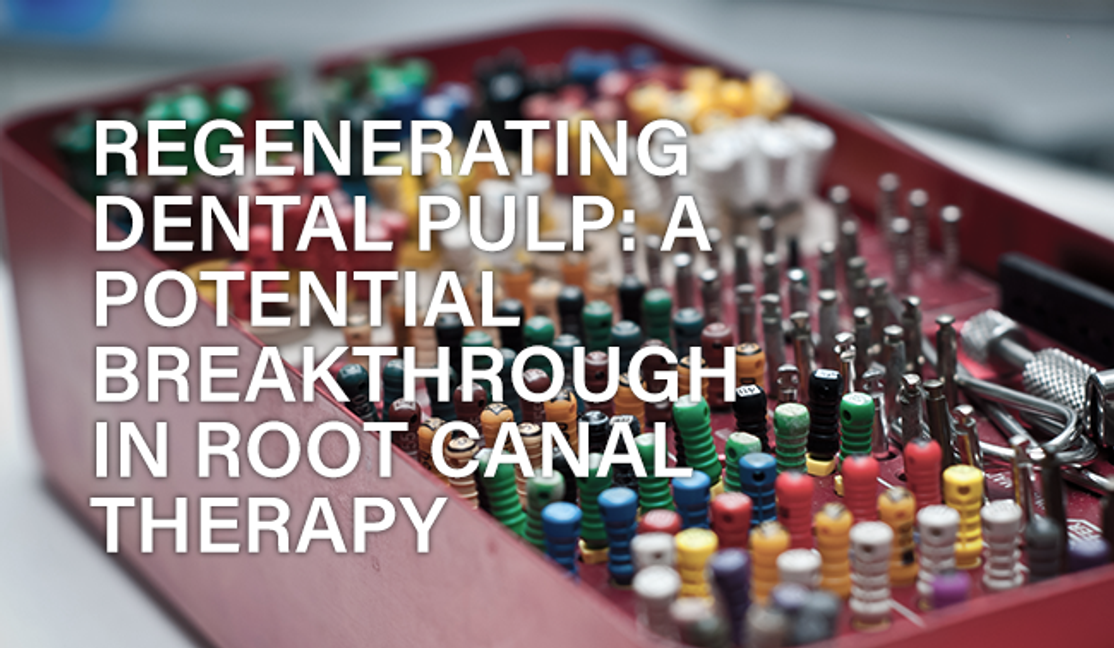New Research on Regenerating Dental Pulp
Posted by Oscar on 26th Mar 2023
Root canal therapy is a common dental procedure used to treat teeth that have become infected or inflamed. The process involves removing the infected or damaged pulp from the tooth's interior, cleaning out the root canal, and then filling the space with a rubber-like material. Despite being a highly effective treatment, the procedure has limitations, as it leaves a dead sensory organ inside the tooth, which can become susceptible to subsequent infection and may eventually fall out.
However, researchers from the New Jersey Institute of Technology have developed a peptide hydrogel that could one day alleviate this problem. The hydrogel is designed to regenerate dental pulp after root canal therapy. Dr. Vivek Kumar, the lead researcher, presented the results of the study at the 256th National Meeting and Exposition of the American Chemical Society in Boston. Article here
The researchers added a piece of a protein that makes dental pulp stem cells proliferate to a self-assembling angiogenic peptide. When the new peptide was added to cultured dental pulp stem cells, it caused the cells to proliferate and activated them to deposit calcium phosphate crystals. However, the researchers found that the peptide degraded within one to three weeks. To address this issue, they redesigned the peptide backbone, resulting in a much more stable version.
Although still in the early research stages, the researchers hope to eventually have a version of the peptide that contains antimicrobial domains. This would allow the dentist to go in with a smaller file, remove a little bit of the pulp, and inject the hydrogel, resulting in the antimicrobial portion of the peptide resolving the infection.
If successful, this technology could revolutionize endodontics by regenerating dental pulp after root canal therapy, potentially eliminating the need for tooth extraction or dental implants in some cases. Dental pulp regeneration could also lead to improved outcomes and longevity of dental restorations, as the regenerated pulp would provide a healthier foundation for the restoration.
However, while the potential benefits of dental pulp regeneration are significant, there are still several challenges that need to be overcome before this technology can become widely available. Some of the key challenges include developing effective biomaterials for pulp regeneration, optimizing the regeneration process to ensure proper pulp functionality, and ensuring the safety and efficacy of the treatment.
"Cells and material-based strategies for regenerative endodontics" article published in August, 2022 provides a comprehensive overview of the current state of research on dental pulp regeneration, highlighting both the potential benefits and challenges of this technology.
The authors review recent studies on dental pulp regeneration, including the use of stem cells, growth factors, and biomaterials. They highlight the potential benefits of dental pulp regeneration, such as improved tooth function and longevity, as well as the challenges and limitations of the current research.
The authors also discuss the importance of developing safe and effective biomaterials for dental pulp regeneration, as well as optimizing the regeneration process to ensure proper pulp functionality. They also note the need for further research on the safety and efficacy of dental pulp regeneration, as well as the ethical implications of using stem cells for this purpose.
According to the American Association of Endodontists, approximately 15 million root canal procedures are performed in the United States each year. This makes root canal therapy one of the most common dental procedures performed in the country.
Root canal therapy is typically recommended when the dental pulp, which is the soft tissue inside the tooth, becomes infected or damaged. This can occur due to a variety of reasons, such as tooth decay, trauma, or repeated dental procedures. If left untreated, an infected or damaged dental pulp can lead to pain, swelling, and even tooth loss.
Root canal therapy involves removing the damaged or infected dental pulp, cleaning and shaping the root canal system, and filling the space with a biocompatible material. In some cases, a dental crown may be placed over the treated tooth to provide additional protection and support.
While root canal therapy has a high success rate, it is important for patients to maintain good oral hygiene and attend regular dental checkups to ensure the longevity of the treatment.

